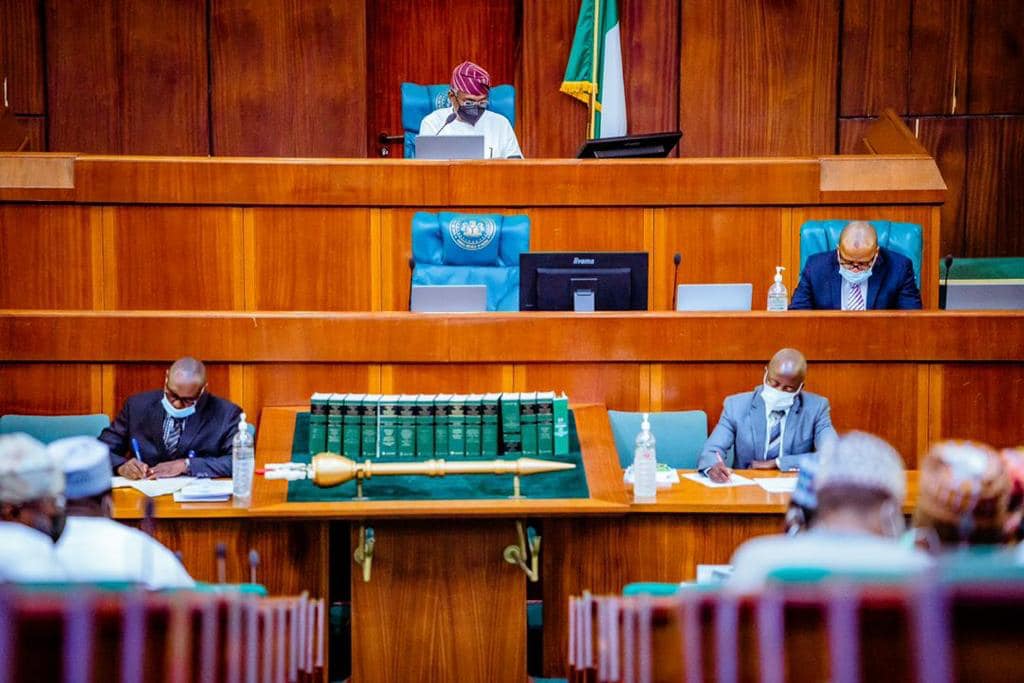The House of Representatives, on Monday, August 16, 2021, vowed to ensure thorough scrutinisation of the 2022 budget estimates of various Ministries, Departments, and Agencies, MDAs, with the view to checkmate the recycling capital projects.
Abiodun Faleke, the chairman, House Committee on Finance, read the riot act, during the interactive session with Minister of Finance, Mrs Zainab Ahmed; Comptroller General of Nigeria Customs Service, NCS, Hammed Ali, and other heads of Ministries, Departments, and Agencies, MDAs, on the 2022-2024 Medium-Term Expenditure Framework/Fiscal Strategy Paper (MTEF/FSP).
According to him, the “2022 budget estimates will be derived from the MTEF/FSP which comprises of a government plan to accelerate our economic recovery process, promote social inclusion and strengthen the resilience of the economy.
“This has become necessary in the face of supply chain disruptions and heightened uncertainties occasioned by the COVID 19 pandemic, especially with the renewed wave of the prevalent Delta variant not only in our country but across the world.
“Nigeria like most developing countries are currently facing severe fiscal crises requiring serious fiscal discipline. It is no longer news that relying on oil as the only source of income is no longer feasible for effective sustainable development and budget implementation.
“The idea where the MDAs recycle unnecessary capital projects in the budget without due regards to essential projects that will engender sustainable development in the country is no longer tenable.
“During this exercise, the National Assembly through the Committee of Finance will scrutinize the capital vote, line item by line item, and provide funds for agencies In-house capital requirements that are necessary bearing in mind the overall objectives of the MTEF/FSP as an instrument for revamping ongoing drive to accelerate investment in critical infrastructures and human capital for sustainable social welfare and improved business environment
“All Federal Government Ministries, Departments, and Agencies are therefore advised to scale down on white elephant projects contained in their budget proposals, as a way of shoring up revenue for critical infrastructure and development of capital resources that have a direct impact on the people.
“For a more informed analysis, all MDAs are expected to appear before the committee with details of their actual income and expenditure profile for the three years running, 2018-2021, as the basis for MTEF/ FSP consideration.
“This exercise is pursuant to the Committee’s inherent jurisdiction, Standing Orders of the House of Representatives, The Fiscal Responsibility Act 2007, and the Constitution of the Federal Republic of Nigeria 1999 as amended.
“While the National Assembly is currently observing its annual recess, the House Committee on Finance stayed back to discharge this national assignment, to ensure that we expedite action on the 2022 budget presentation which will soon be presented by Mr President on our resumption. We are prepared to make this sacrifice in the interest of the generality of Nigerian people,” he assured.
In his keynote address, the Speaker, Hon. Femi Gbajabiamila who observed that the National Assembly will shortly receive and begin consideration of the 2022 Appropriations Bill, expressed optimism that the MTEF/FSP will have a direct impact on the content of that appropriations Bill, as well as on our ability to deliver on the promises of governance and development that we have made to the Nigerian people.
The Speaker who was represented by Majority Leader, Hon. Alhassan Ado-Doguwa who noted that the interactive session with the MDAs is of great strategic importance to our country’s future lamented that the “COVID-19 pandemic has had a significant disruptive effect on the global economy.
“Countries all over the world have experienced economic contraction with different levels of severity. Our situation has of course been compounded by other factors unique to society.
“The consequence of these developments is that our ability to pursue a robust development agenda has been severely constrained. However, the fact of this new reality does not absolve us of the obligation to do all that is necessary to achieve our nation’s most pressing development objectives.
“More than anything else, this moment requires us above all to engage in an honest assessment of the local and international economic dynamics that underpin our decisions about budgeting, spending, and strategic planning. It is not in the best interest of Nigeria, and it does not serve the government’s agenda to make plans based on projections that are unlikely to come to fruition.
“We cannot make projections and commitments unless we are reasonably certain that we can achieve those projections and deliver on the commitments we have made.
“The legislature is, by constitutional imperative, the keeper of the public purse. In this capacity, the House of Representatives have the responsibility and the authority to act on behalf of the Nigerian people, to ensure that our collective resources are efficiently managed in service of the public good.
“Let no one be in any doubt of our commitment in the 9th House of Representatives to live up to that responsibility by exercising the full extent of our authority as it relates to the appropriations process and oversight. As such, I ask that all of the ministries, departments, and agencies of government commit to working with us in a collaborative process in the best interests of our people.
“Let us also endeavour to ensure that our engagements here today, and going forward, are grounded in a shared determination to help our beloved nation reach its promise of peace and prosperity for all,” the Speaker noted.
Source: Tribune







